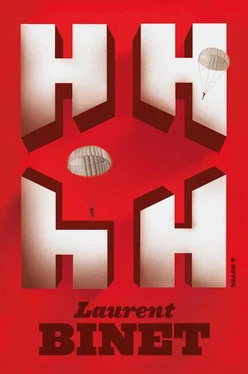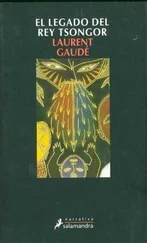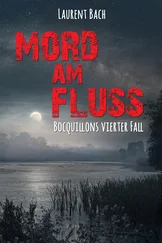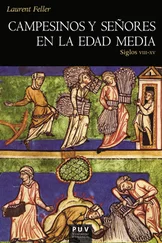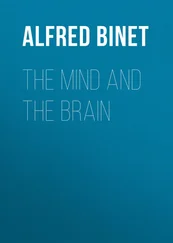Laurent Binet - HHhH
Здесь есть возможность читать онлайн «Laurent Binet - HHhH» весь текст электронной книги совершенно бесплатно (целиком полную версию без сокращений). В некоторых случаях можно слушать аудио, скачать через торрент в формате fb2 и присутствует краткое содержание. Город: New York, Год выпуска: 2012, ISBN: 2012, Издательство: Farrar, Straus and Giroux, Жанр: Историческая проза, на английском языке. Описание произведения, (предисловие) а так же отзывы посетителей доступны на портале библиотеки ЛибКат.
- Название:HHhH
- Автор:
- Издательство:Farrar, Straus and Giroux
- Жанр:
- Год:2012
- Город:New York
- ISBN:978-0-374-16991-6
- Рейтинг книги:3 / 5. Голосов: 1
-
Избранное:Добавить в избранное
- Отзывы:
-
Ваша оценка:
- 60
- 1
- 2
- 3
- 4
- 5
HHhH: краткое содержание, описание и аннотация
Предлагаем к чтению аннотацию, описание, краткое содержание или предисловие (зависит от того, что написал сам автор книги «HHhH»). Если вы не нашли необходимую информацию о книге — напишите в комментариях, мы постараемся отыскать её.
HHhH — читать онлайн бесплатно полную книгу (весь текст) целиком
Ниже представлен текст книги, разбитый по страницам. Система сохранения места последней прочитанной страницы, позволяет с удобством читать онлайн бесплатно книгу «HHhH», без необходимости каждый раз заново искать на чём Вы остановились. Поставьте закладку, и сможете в любой момент перейти на страницу, на которой закончили чтение.
Интервал:
Закладка:
As usual, Heydrich eats his breakfast while reading the day’s newspapers, delivered to him from Prague every morning at dawn. At nine o’clock his black (or dark green) Mercedes arrives, driven by his chauffeur—a giant SS guard, about six feet five inches tall, called Klein. But this morning, Heydrich makes him wait. He plays with his children (I have trouble imagining Heydrich playing with his children) and goes for a walk with his wife in the immense gardens that surround their house. Lina probably has to keep him up-to-date on the work that’s being done. The plan is to cut down the ash trees and replace them with fruit trees. At least, that’s what Ivanov says in his historical account of the assassination. I wonder if he made it up? According to him, the Heydrichs’ youngest child, Silke, told her father that someone called Herbert had taught her how to load a revolver. Silke is three years old. But I suppose nothing, in such troubled times, should surprise me.
213
It is May 27: the anniversary of Joseph Roth’s death. He died three years before in Paris, of alcoholism and sorrow. Roth was a fierce and prophetic observer of the Nazi regime during its early years. In 1934, he wrote: “What swarmings of people in this world, an hour before its end!”
Two men board a tram. Thinking it might be their last journey, they watch avidly as the streets of Prague rush past the window. Then again, they might have chosen to see nothing, to think about nothing, gathering their concentration by blocking out the outside world… but I doubt it. They’ve been on the alert for so long it’s become second nature. Boarding the tram, they automatically check out the appearances of all the other male passengers: who gets on and off, who stands in front of each door. They can tell instantly who’s speaking German, even at the other end of the carriage. They note the vehicle in front of the tram, and the one behind it, and how far away they are. They spot the Wehrmacht motorbike and sidecar as they overtake on the right; they glance at the patrol going back up the pavement; they note the two men in leather raincoats standing guard outside the building opposite… okay, I’ll stop there. Gabčík is also wearing a raincoat, but although the sun is shining it’s still cool enough for him not to attract unwanted attention. Or perhaps he’s carrying it on his arm? He and Kubiš have dressed smartly for the big day, and each grips a heavy briefcase.
They get off somewhere in Žižkov, the district named after the legendary Jan Žižka, the greatest and most ferocious Hussite general—the one-eyed man who for fourteen years resisted the armies of the Germanic Holy Roman Empire; the Taborite leader who brought down the wrath of heaven on all Bohemia’s enemies. They go to the house of a contact to pick up two bicycles. One of the bikes belongs to Aunt Moravec. On Holešovice Street, they stop to greet another lady of the Resistance—another surrogate mother who sheltered them and made them cakes: a Mrs. Khodlova, whom they wish to thank. You haven’t come to say goodbye, have you? No, not at all, we’ll come to see you soon—perhaps even today. Will you be at home? Yes, of course, please come…
When they finally get there, Valčík is already waiting for them. There is perhaps a fourth parachutist—Lieutenant Opalka from Out Distance, come to give them a hand—but his role has never been clarified, nor has his presence even been verified. So I’ll stick to what I know.
It is not yet nine o’clock. After a brief discussion, the three men go to their posts.
214
It is nearly ten o’clock and Heydrich still hasn’t left for work. That evening, he must fly to Berlin for a meeting with Hitler. Perhaps he is taking particular care to prepare for it? Ever the meticulous bureaucrat, he is probably checking the documents in his briefcase one last time. In any case, it’s already ten o’clock when Heydrich takes his place in the front seat of the Mercedes. Klein starts the engine, the gates open, and the guards, right arms outstretched, salute the Protector as he passes. Then the Mercedes convertible accelerates up the road.
215
While Heydrich’s Mercedes snakes along the thread of its knotted destiny, while the three parachutists keep an anxious lookout, all their senses alert, on that deadly bend of the road, I reread the story of Jan Žižka, told by George Sand in a little-known book called Jean Zizka . And once more I become distracted. I see the fierce general sitting enthroned on his mountain: blind, his skull shaved, his braided Asterix-style mustaches drooping onto his chest like creepers. At the foot of his improvised fortress, ready to attack, is Sigismond’s imperial army. Battles, massacres, sieges, and spoils of war pass before my eyes. Žižka was the king’s chamberlain in Prague. It’s said that he entered the war against the Catholic Church out of hatred for priests—because a priest had raped his sister. This is the era of the first famous defenestrations in Prague. No one knows yet that this small fire in Bohemia will blaze up into more than a century of terrible religious wars, and that from the ashes of Jan Hus will rise Protestantism. I learn that the word “pistol” comes from the Czech píštala . I learn that it was Žižka, with his battalions of heavily armed chariots, who practically invented tank warfare. Apparently, Žižka found the man who raped his sister and punished him terribly. Apparently, too, Žižka was one of the greatest war leaders in history, because he never suffered defeat. I am spreading myself too thinly. Everything I read takes me farther and farther away from the curve in Holešovice Street. And then I stumble on this phrase of George Sand’s: “Poor workers or sick people, you must always struggle against those who tell you: ‘Work hard to live badly.’” That isn’t an invitation to digress—it’s a demand! But I am concentrated on my objective now. I will no longer let myself be distracted. A black Mercedes glides along the road—I can see it.
216
Heydrich is late. It is already ten o’clock. Rush hour is over, and Gabčík and Kubiš’s presence on the pavement is becoming more conspicuous. In 1942, anywhere in Europe, two men standing alone for a long time in the same place quickly attract suspicion.
I am sure they are sure that the game is up. Each passing minute increases the risk that they will be spotted by a patrol and arrested. But still they wait. The Mercedes should have been here more than an hour ago. According to the carpenter’s records, Heydrich has never arrived at the castle after ten o’clock. Everything says he is not coming. He could have changed his route, or gone straight to the airport. Perhaps he’s already taken off, never to return.
Kubiš is leaning against a lamppost, on the inside of the curve. Gabčík, on the other side of the crossroads, pretends to wait for a tram. He must have seen a good dozen pass already and he’s no longer counting. The flood of Czech workers gradually abates. The two men are more and more exposed. Little by little the hum of the city fades and the calm that descends on the curve in the road is like an ironic echo of their disastrous mission. Heydrich is never late. He’s not coming.
But obviously I wouldn’t have written this whole book if Heydrich wasn’t coming.
At half past ten, the two men are struck by lightning—or rather by the light of the sun reflected, from the hill above them, by the little mirror that Valčík has taken from his pocket. It’s the signal. He is coming. At last! In a few seconds he’ll be there. Gabčík runs across the road and positions himself at the exit of the curve, hidden by it until the last moment. Unlike Kubiš, who is farther forward (unless he’s behind Gabčík, as some reconstructions claim, but that seems less likely to me), he can’t see that the Mercedes outlined against the horizon is not followed by a second car. I bet he hasn’t even given it a thought. At this moment, one single idea takes all the space in his fevered brain: shoot the target. But then, from behind, he hears the unmistakable noise of a tram approaching.
Читать дальшеИнтервал:
Закладка:
Похожие книги на «HHhH»
Представляем Вашему вниманию похожие книги на «HHhH» списком для выбора. Мы отобрали схожую по названию и смыслу литературу в надежде предоставить читателям больше вариантов отыскать новые, интересные, ещё непрочитанные произведения.
Обсуждение, отзывы о книге «HHhH» и просто собственные мнения читателей. Оставьте ваши комментарии, напишите, что Вы думаете о произведении, его смысле или главных героях. Укажите что конкретно понравилось, а что нет, и почему Вы так считаете.
